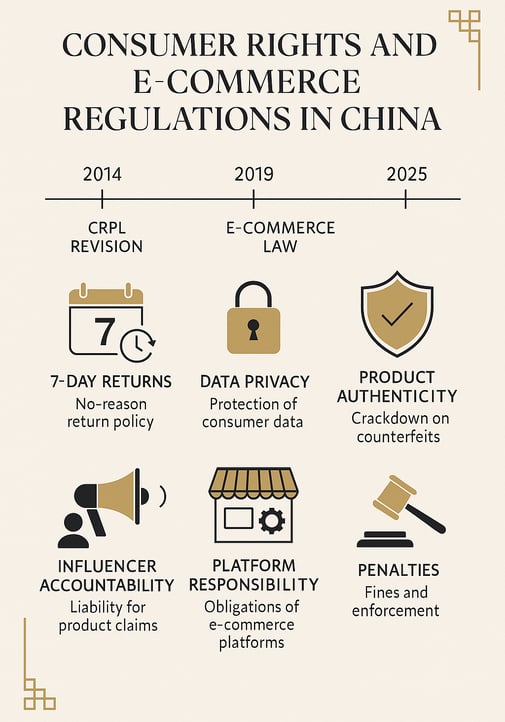Selling in China? Know the Consumer Rights Regulations Before You Launch
CHINACONSUMPTION
9/19/2024
1. The Reign of Mobile Wallets
1. The Consumer is King in China
Since the revision of China’s Consumer Rights Protection Law (CRPL) in 2014, the focus has been squarely on consumer-first policies. These include:
7-day no-reason return policy on most online purchases
Mandatory disclosure of product info, terms, and refund policies
Clear labeling for imported or cross-border goods
Seller responsibility for false advertising or misleading claims
These policies are actively enforced, and e-commerce platforms are held accountable alongside sellers, often suspending non-compliant stores to avoid legal risk.
2. The E-Commerce Law of 2019
A landmark in digital commerce governance, the E-Commerce Law applies to platforms, merchants, influencers (KOLs), and cross-border sellers alike. Key takeaways include:
Real-name registration for all merchants
Transparency in algorithms and search rankings
Obligations to combat fake reviews and counterfeit goods
Clear responsibility for consumer data privacy and security
Even international brands selling via Tmall Global or Douyin Cross-border must comply, making legal localization essential.
3. What Brands Must Watch Out For
Product authenticity: Counterfeit products are aggressively targeted; brands must prove product origin and supply chain legitimacy.
After-sales support: A weak or unresponsive customer service process damages both brand and platform trust.
Influencer partnerships: KOLs can be legally liable for product claims—make sure your brand messaging is aligned and compliant.
4. Penalties Are Real—and Public
Violations often result in platform bans, public blacklists, or consumer backlash. China’s regulatory bodies—especially the SAMR (State Administration for Market Regulation)—publish enforcement actions and fines regularly. Trust, once lost, is hard to recover in this competitive market.
China is not just one of the world’s most dynamic e-commerce markets—it’s also one of the most tightly regulated. While the rapid growth of online platforms might suggest a “Wild West” environment, the reality is that Chinese consumer protection laws are robust, evolving fast, and strictly enforced, especially in the digital space.
For Western brands looking to enter China via platforms like Tmall, Douyin, or JD.com, compliance with local regulations is not just about avoiding fines—it’s about building trust with increasingly rights-conscious consumers
Consumer protection in China is not just a legal checkbox—
it’s a competitive differentiator.
Brands that align with consumer expectations, offer transparent policies,
and show respect for local laws earn loyalty, advocacy, and long-term success.


